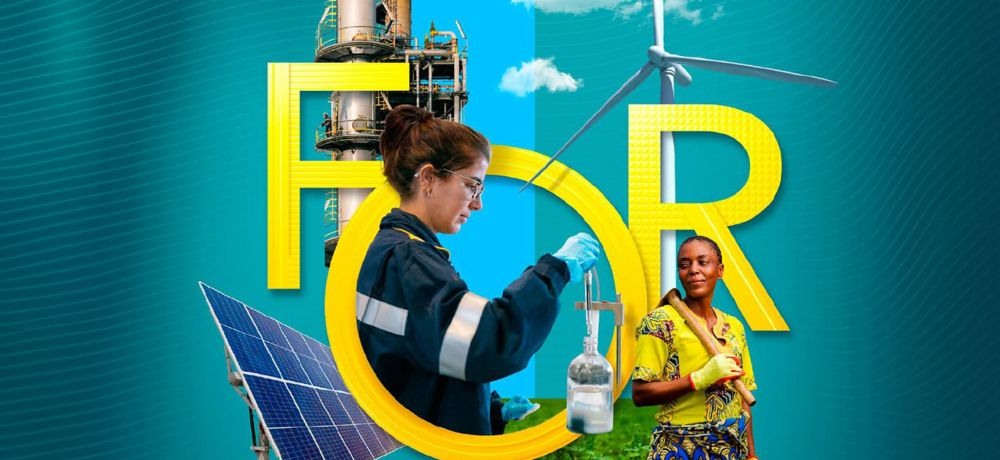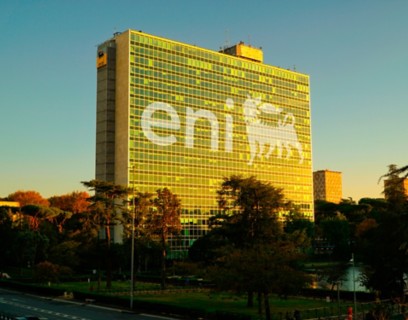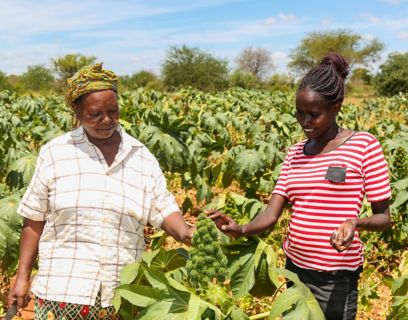
As a result of its work over the years, Eni ranked third overall in the extractive and apparel sectors and second among energy companies in the 2023 Corporate Human Rights Benchmark (CHRB) held by the World Benchmark Alliance (WBA). The benchmark assesses what companies are doing to ensure respect for human rights through their policies, processes and practices, based on publicly available information. As well as recognizing the solidity of the model of integrating respect for human rights into corporate processes, the benchmark highlights how Eni stands out in giving centrality to its stakeholders, engaging them and taking their opinions into account in shaping and improving its approach to human rights. Within the 2023 Gender Assessment conducted by WBA on a sample of over 1000 companies, Eni is one of the two companies with the highest score.
The principles and practices that underpin our commitment
We believe it is our duty to improve the well-being of the people in the countries where we work, respecting their dignity and striving for a just and inclusive transition. The terms of our commitment are set out in our Code of Ethics, in the new policy "Respect for Human Rights in Eni"* approved by Eni’s Board of Directors, and in the Supplier Code of Conduct. These documents contain the guiding principles that shape our actions and the expectations we have of those who work with us. These principles are also referred to in the Global Framework Agreement on Industrial Relations at an international level and on Corporate Social Responsibility.
We confirm our commitment also by adhering to the United Nations Guiding Principles on Business and Human Rights (UNGPs), the Organisation for Economic Co-operation and Development Guidelines for Multinational Enterprises (OECD Guidelines) and the Principles on Security and Human Rights. We actively participate as a Full Corporate Member in the Voluntary Principles Initiative (VPI), a multi-stakeholder project focused on respect for human rights in the management of security operations.
* the Policy repeals the pre-existing “Eni’s Statement on Respect for Human Rights”
We need to build a resilient human rights system and each of us is called to play its part. As Eni, we strongly feel this imperative and we concretely support a just transition focusing on workers, suppliers, communities and customers to create a responsible, shared and widespread human rights culture together with our stakeholders.
Claudio Descalzi
CEO of Eni

People at the centre of our approach for a fair and inclusive transition
We are committed to ensuring that the path to decarbonization puts people first and creates opportunities for workers, communities and economies in the countries where we operate by developing new supply chains and converting existing operations while respecting human rights.
Eni routinely monitors its human rights activities
We are committed to conducting due diligence on our human rights activities. We consistently assess and monitor both actual and potential impacts, and identify specific strategies and solutions to increase the effectiveness of preventing and mitigating negative impacts. This includes providing specific instructions and specialised training to employees as well as targeted awareness initiatives for subcontractors and other partners.
The main themes concerning Human Rights
Our areas of interest in the field of human rights, divided by category and areas of implementation.
| Human rights in the workplace | Human rights in contracting and procurement | Human rights in communities | Human Rights and Security |
|---|---|---|---|
| Discrimination and equal treatment based on religion, ethnicity and gender | Modern day slavery | Land rights | Excessive use of force by public and private security forces |
| Safe and healthy working conditions | Migrant workers | Environmental impacts resulting in impacts on livelihood, health, water availability of communities and Indigenous Peoples | Employee security in high-risk environments |
| Freedom of association and Collective bargaining | Freedom of association and Collective bargaining | Project closure | |
| Working conditions (wages and working hours) | |||
| Safe and healthy working conditions |
The most significant themes
In line with the UNGPs, we have identified the key issues relevant to our business activities and operating contexts and organised them into four priority areas for action.
We apply the principles set out in the International Labour Organization's (ILO) Tripartite Declaration on Multinational Enterprises and Social Policy:
freedom of association and the effective recognition of the right to collective bargaining
the elimination of all forms of forced or compulsory labour
the effective abolition of child labour
the elimination of discrimination in respect of employment and occupation
We are committed to ensuring decent working conditions and a work environment free from all forms of discrimination or abuse, by establishing working relationships characterised by fairness, equality, non-discrimination, care and respect for the dignity of the individual, as reflected in Eni's policy against violence and harassment in the workplace.
In 2021 we have endorsed the UN Women Empowerment Principles (WEP) to emphasise our commitment to promoting gender equality and empowering women, as outlined in the 2030 Agenda for Sustainable Development and the 17 SDGs. After adhering to the WEPs, Eni initiated self-assessment process of its performance based on the Gender Gap Analysis Tool, which led to the development of an Action Plan. This is the basis for building a more comprehensive approach to gender equality and women's empowerment in all areas of the company.
Our strategy is aimed at ensuring the full commitment of the entire supply chain to upholding human rights. This includes not only specific assessments and contractual requirements, but also engaging suppliers in initiatives to effectively obtain and monitor human rights awareness and attention.
Learn more about relations with suppliers
We seek to ensure that our partners adhere to the principles set out in our commitment documents. Every effort is made to include ad hoc human rights clauses in contractual agreements related to activities carried out with or for Eni.
We respect the rights of individuals and local communities in the countries where we work, focusing in particular on the protection of the environment and biodiversity, on the preservation of local cultures and the right to the highest attainable standard of physical and mental health. We protect the right to access to water, to ownership and use of land and natural resources.
We are committed to respecting the specific rights of indigenous peoples in accordance with international standards, the Indigenous and Tribal Peoples Convention (ILO169) and the United Nations Declaration on the Rights of Indigenous Peoples (UNDRIP).
Before initiating our business or local development activities, we conduct prior, free and informed consultations with stakeholders to meet their legitimate expectations regarding the design and implementation of activities and their participation.
For industrial projects considered to be at higher risk, we conduct specific studies, Human Rights Impact Assessments (HRIAs), to identify potential negative impacts, recommendations and prevention and mitigation measures, which are translated into concrete action plans.
In line with international reference standards, the Voluntary Principles on Security and Human Rights and the United Nations Basic Principles on the Use of Force and Firearms by Law Enforcement Officials, we have developed a coherent set of rules and tools to be followed by all security personnel protecting Eni employees and facilities. This ensures that:
- contractual terms include provisions on respect for human rights
- suppliers of security providers are selected on the basis of human rights considerations, among other criteria
- security operators and supervisors receive appropriate training on respect for human rights
- events that are considered to be at greater risk are handled in accordance with international standards.
The most significant themes
In line with the UNGPs, we have identified the key issues relevant to our business activities and operating contexts and organised them into four priority areas for action.
We apply the principles set out in the International Labour Organization's (ILO) Tripartite Declaration on Multinational Enterprises and Social Policy:
freedom of association and the effective recognition of the right to collective bargaining
the elimination of all forms of forced or compulsory labour
the effective abolition of child labour
the elimination of discrimination in respect of employment and occupation
We are committed to ensuring decent working conditions and a work environment free from all forms of discrimination or abuse, by establishing working relationships characterised by fairness, equality, non-discrimination, care and respect for the dignity of the individual, as reflected in Eni's policy against violence and harassment in the workplace.
In 2021 we have endorsed the UN Women Empowerment Principles (WEP) to emphasise our commitment to promoting gender equality and empowering women, as outlined in the 2030 Agenda for Sustainable Development and the 17 SDGs. After adhering to the WEPs, Eni initiated self-assessment process of its performance based on the Gender Gap Analysis Tool, which led to the development of an Action Plan. This is the basis for building a more comprehensive approach to gender equality and women's empowerment in all areas of the company.
Our strategy is aimed at ensuring the full commitment of the entire supply chain to upholding human rights. This includes not only specific assessments and contractual requirements, but also engaging suppliers in initiatives to effectively obtain and monitor human rights awareness and attention.
Learn more about relations with suppliers
We seek to ensure that our partners adhere to the principles set out in our commitment documents. Every effort is made to include ad hoc human rights clauses in contractual agreements related to activities carried out with or for Eni.
We respect the rights of individuals and local communities in the countries where we work, focusing in particular on the protection of the environment and biodiversity, on the preservation of local cultures and the right to the highest attainable standard of physical and mental health. We protect the right to access to water, to ownership and use of land and natural resources.
We are committed to respecting the specific rights of indigenous peoples in accordance with international standards, the Indigenous and Tribal Peoples Convention (ILO169) and the United Nations Declaration on the Rights of Indigenous Peoples (UNDRIP).
Before initiating our business or local development activities, we conduct prior, free and informed consultations with stakeholders to meet their legitimate expectations regarding the design and implementation of activities and their participation.
For industrial projects considered to be at higher risk, we conduct specific studies, Human Rights Impact Assessments (HRIAs), to identify potential negative impacts, recommendations and prevention and mitigation measures, which are translated into concrete action plans.
In line with international reference standards, the Voluntary Principles on Security and Human Rights and the United Nations Basic Principles on the Use of Force and Firearms by Law Enforcement Officials, we have developed a coherent set of rules and tools to be followed by all security personnel protecting Eni employees and facilities. This ensures that:
- contractual terms include provisions on respect for human rights
- suppliers of security providers are selected on the basis of human rights considerations, among other criteria
- security operators and supervisors receive appropriate training on respect for human rights
- events that are considered to be at greater risk are handled in accordance with international standards.
All data on our sustainability performance

The importance of the complaints mechanism
We have grievance mechanisms and reporting channels in place, both at our headquarters and at our operating sites, to ensure that any potential human rights violations are promptly identified, analysed, managed and, if substantiated, remedied. In particular, there are two specific tools within the company's regulatory system that can be used also in the event of alleged human rights violations:
● the Grievance Mechanism, which consists of a set of procedures defined by Eni for the submission, in written or verbal form, of petitions or complaints relating to the activities carried out, as well as their management and resolution
● Reporting, which consists of the possibility for anyone, whether an employee or a third party, to report, also confidentially or anonymously, issues related to the Internal Control System or other matters that violate the Code of Ethics, such as business ethics, mobbing, harassment, discrimination and respect for human rights.
We do not tolerate and are committed to preventing retaliation against employees and other stakeholders who report human rights concerns. We also cooperate with other judicial and non-judicial mechanisms, among them the national contact points established under the OECD Guidelines for Multinational Enterprises.
How to report abuses and violations
Eni allows anyone to send reports or alleged breaches of the Code of Ethics, guaranteeing confidentiality and anonymity.
Our commitment to human rights in figures
Numbers, activities and rankings on the issues we care about.
of security contracts containing human rights clauses
of new suppliers assessed according to social criteria
participants at the Security & Human Rights Workshop in Nigeria
hours of human rights training provided in 2022
Our cooperation with international bodies
Our commitment to human rights and their promotion is also reflected in our cooperation with various international bodies. Here are some examples:
- we adhere to the principles of the UN Global Compact
- we cooperate with the International Training Centre, the International Labour Organisation's (ILO) training institute
- we discuss sustainability issues with other O&G companies as part of IPIECA
- we collaborate with the IHRB, an independent organisation and a global centre of excellence on the relationship between business and human rights
- we cooperate with the United Nations Development Programme, FAO, Unesco.
Eni for 2022. Our support for human rights in the Just Transition
In Eni’s sustainability report you can find goals, strategies, projects, results for a fair and inclusive energy transition. Browse the interactive feature and download the full document.



















